With everything that’s going on in our world it’s very easy to feel incredibly overwhelmed by all of the information that we’re hearing about Coronavirus COVID-19. The levels of anxiety in the community are rapidly rising and it is understandable if your children are feeling anxious too. They are hearing about Coronavirus COVID-19 from the media, at school in the playground and could be worried that they or someone they love is going to get sick. Many parents I’ve spoken with are wondering how to broach the epidemic. The following suggestions will provide you with practical strategies to empower your children with knowledge during this global time of uncertainty.
Don’t avoid the topic
Most children have already heard about the virus either from the news media, at school or listening to the conversations of adults close to them. If we avoid talking about the Coronavirus with them it can increase their worry and anxiety as they want to know what’s going on and may catastrophise things in their minds if we don’t talk openly discuss it with them. Transparency is crucial for kids they can tell when there is a proverbial elephant in the room that no-one is talking about. The conversations you have can be opportunities to communicate correct factual information and set the emotional tone for your children.
Be calm and reassuring
Before talking to your children about the Coronavirus you need to firstly ensure you’re aware of your own levels of anxiety or fear and manage these before you speak to your kids. Parents need to be the safe calm adults leading their children through this time of uncertainty as when parents are calm and reassuring your children are more likely to be calm. If you are anxious, or frightened, they will pick up on this energy and emotion and respond accordingly. Just as you would in any other difficult situation keep adult conversations amongst adults. Panic from parents becomes panic for children so role modelling a calm measured response is essential to for your kids can be hard but it’s really help them feel safe.
Be honest but age appropriate
We need to be honest with our children and give them enough age appropriate information, so they know what’s going on, but not overwhelm them with information overload. Keep it simple for younger children and provide more detailed information for older kids, teach them about media literacy and finding reputable sources of information to trust. Also keep messages as positive as possible explaining that even though it is a very nasty virus 81% of people who get it will only get a very mild version and then get better and that children aren’t being impacted as much as adults who get it. The most important thing children of all ages need to know is that you’re going to take care of them and lots of grown-ups are working together to figure out ways to help people and make sure we all get through it.
Limit news exposure
As parents we need to turn off the constant bombardment from all forms of the media as it’s simply going to make children more worried and anxious. Frequently stories on social media and the internet can be misleading and incorrect so we need to be the source of information about the Coronavirus for our children. The continuous onslaught of the 24-hour news cycle can become very overwhelming for both us and our children so take a break for your own wellbeing. I’m not saying we have to be ignorant or switch off all media entirely I simply want you to be aware of where you’re getting your news from and be very selective about your media diet and that of your children.
Give them a sense of control and power
Children feel empowered when they know what to do to keep themselves safe so remind them that they can keep themselves safe by doing some very important hygiene practices:
- Coughing and sneezing into their crooked elbow
- blowing their nose into a tissue then throwing that tissue away and
- washing their hands, washing their hands thoroughly with soap and water for at least 20 seconds (the length of two happy birthday verses) after they come have been playing, before they eat, after blowing their nose, coughing sneezing or using the bathroom
- not touching their face with their hands
- bumping elbows or fist bumping
- social distancing
These strategies make them part of the solution and empower them to take action and not feel so helpless.
Look for the helpers
When there is such a negative and fearful tone to the information and images that are circulating it’s important for children to know that people are helping each other through acts of kindness and generosity. Share good news stories with them about people being kind to neighbours, helping elderly friends or relatives and sharing their resources. Talk to your children about people your family could help during this difficult time, as this encourages them to think about what they can do to help others and gives them a sense of control. Highlight the work of scientists doing who are helping to stop the outbreak and keep the community safe. Let them know there’s kind-hearted people working to try and stop the virus spreading
Model Resilience
Every time you talk to your children about the coronavirus you need to model resilience by finishing the conversation off in an optimistic way that encourages them to be part of the solution. When we think about things that are frightening and overwhelming our brains choose to either panic and become fearful or take action and feel like empowered and hopeful. When you finish talking to your kids about Coronavirus, say something like “I’m going to make sure I wash my hands well after blowing my nose or coughing because that will help keep me safe”. This way you are modelling taking action which is a resilient response that provides stability and a sense of psychological safety.
As parents we are leaders for our children, what we model and the tone we set is what they will absorb and internalise. Talking to our children about Coronavirus like this and encouraging them to take the actions that keep themselves and others safe provides them with ways they can make a positive difference in their world.
You may also like to read:
Keeping children safe, well and calm.
9 Tips for Speaking to your Kids about the Corona Virus (COVID-19)









